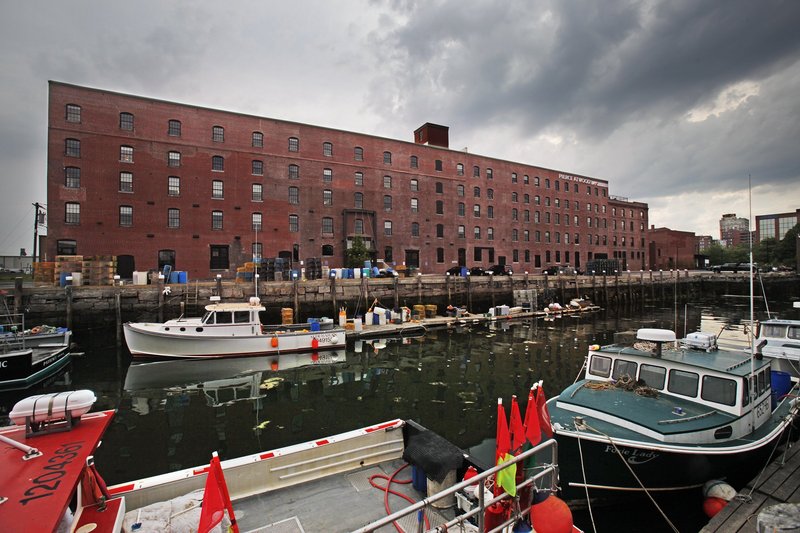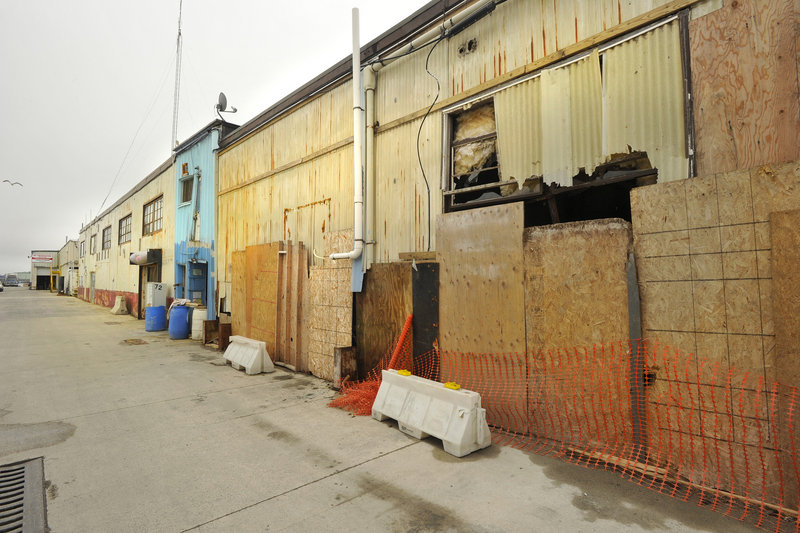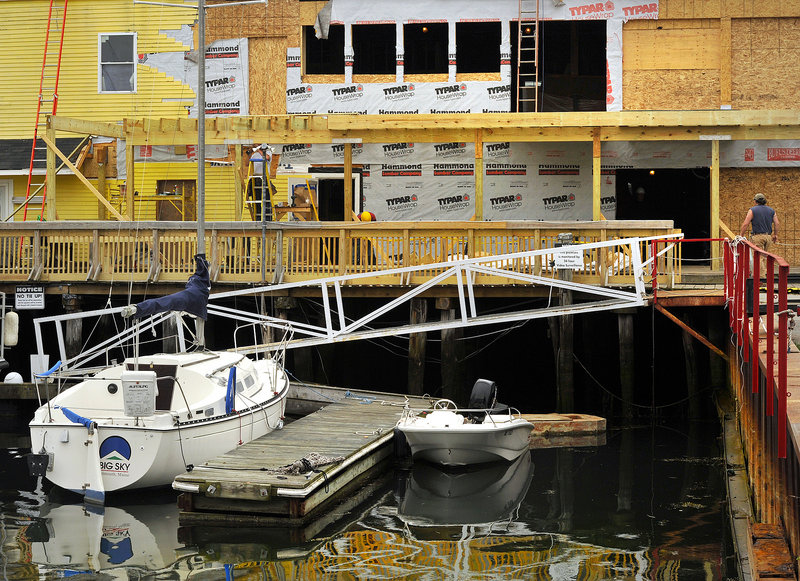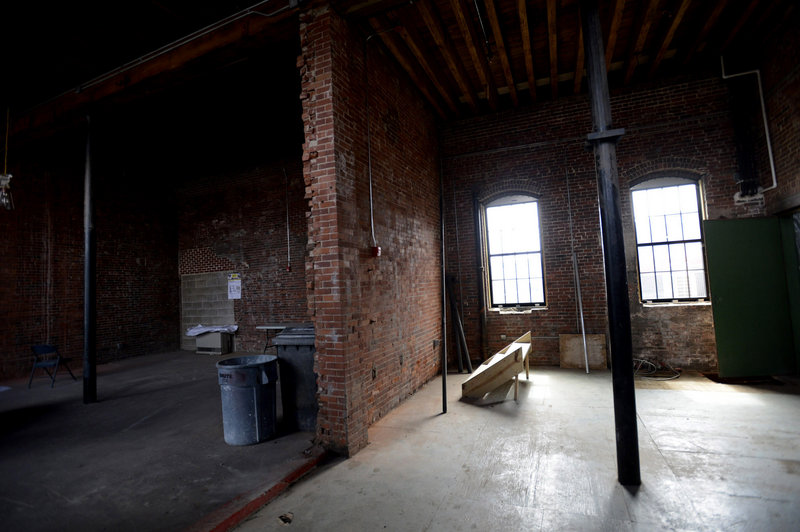PORTLAND – Tenants of the Commercial Street building that houses the Pierce Atwood law firm have filled nearly all of the ground-floor space available for nonmarine uses now that owners of a new gastro-pub have decided to operate on Merrill’s Wharf.
But the space set aside for marine-use tenants remains vacant, despite marketing efforts by the owner’s brokers.
Farther east on Commercial Street, the owners of Maine Wharf, which is being rebuilt, say they’re seeing a similar trend, with high demand from restaurants and other nonmarine users, and little interest from tenants who conduct a marine-related business.
The struggle to comply with the zoning formula that applies on Portland’s waterfront raises questions about the relevance of the marine-only designation. In the coming weeks, the city will receive an updated inventory of waterfront tenants to track how uses have changed since the city relaxed zoning laws to allow more nonmarine uses.
CBRE-The Boulos Co. announced this week that King’s Head LLC has a lease for a 2,250-square-foot gastro-pub serving high-quality beer and food. King’s Head currently operate pubs in Stowe, Vt., and Athens, Ga., and plans to open its Portland restaurant in September, according to CBRE.
When contacted Wednesday, Justin O’Connor, a partner in King’s Head, said that, for marketing purposes, he is not granting interviews until the pub is ready to open.
“It’s going to be a great addition to the building,” said Anthony Gatti, a partner in Waterfront Maine, which owns Merrill’s Wharf.
Since the former Cumberland Cold Storage building was renovated back in 2011, its upper floors have filled with nonmarine tenants, including the Pierce Atwood law firm.
So far the only ground-floor users are Stillwater Yoga, Federle Mahoney and Down East Enterprises — all nonmarine.
Gatti said CBRE is currently negotiating a lease with an office user for the remaining 1,400 square feet of nonmarine space, leaving all of the roughly 12,000 square feet of space for marine uses vacant.
Real estate broker Drew Sigfridson said Waterfront Maine is reducing rents by 25-35 percent to land a marine tenant.
“All of the tenants that would qualify as a marine use are still not able to pay those reduced rents,” Sigfridson said.
Until 2010, only marine uses were allowed on the ground floor of the 15 piers located in the Waterfront Central Zone, which runs from the Maine State Pier to the International Marine Terminal.
When pier owners complained that rents from marine tenants weren’t enough to fund pier repairs, the city relaxed the zoning to allow up to 45 percent of the ground-floor space to be used for nonmarine uses, provided pier owners first marketed space for marine users.
Finding marine tenants is also a challenge for Maine Wharf, which is near Maine State Pier.
Pat Tinsman, who was speaking on behalf of pier owner Stephen Goodrich, said Maine Wharf has been looking for marine tenants for several months to no avail.
“There just aren’t marine uses out there,” Tinsman said.
City Planner Bill Needelman said city staff is updating an inventory of uses within the Waterfront Central Zone to present to the City Council in June.
The annual inventory is a way for city councilors to track the balance of marine and nonmarine uses on the waterfront. A baseline inventory was conducted in 2011, and the updated inventory will cover changes through 2012.
“There hasn’t been a lot of activity,” Needelman said.
The working waterfront is not as robust as it once was, especially when it comes to groundfishing.
In 2012, 6.3 million pounds of groundfish, valued at $7.8 million, were landed in Maine, down from 9.7 million pounds, valued at $12.3 million, in 2008, according to the Maine Department of Marine Resources.
In Portland, only 5.6 million pounds of groundfish worth $8.9 million were landed, down from the 8.1 million pounds valued at $12.1 million in 2008, according to the Portland Fish Exchange.
There are between 40 and 45 active groundfishing licenses in Maine, with about 35 of those fishermen either landing or trucking their catch to Portland, according to DMR spokesman Jeff Nichols.
That’s down from as many as 350 vessels in 1990.
“The fishing year that began on May 1 will impose significant landings restrictions on the ground-fish fleet, so we would not expect to see an increase in participation this year,” Nichols said in an email.
As the groundfish industry has waned, so have industries supporting it, said Larry Legere, chairman of the Waterfront Alliance, a diverse coalition of waterfront users.
“Groundfishing is pretty much nonexistent now,” Legere said.
Lobstering remains a strong industry, as does the cruise-ship industry. The city’s cargo port is slowly making a comeback after a year without service.
Ken Macgowan, whose family owns Custom House Wharf, said he is already at his limit of nonmarine uses, including the Porthole Restaurant and Pub. He has roughly 8,000 square feet of vacant space for a marine tenant, but the only marine uses he sees are lobstermen, who only want berthing space,.
Macgowan said all of his berthing space has been leased to lobstermen, limiting the options for marine uses in his pier buildings.
“It doesn’t do any good to have space for a marine-related tenant if you don’t have a place for them to put their boat,” he said.
Meanwhile, Union Wharf is losing a marine tenant — a lobster-trap maker is moving to the Riverside industrial area — and advertising efforts over the last few months have failed to generate interest from marine users, according to Charlie Poole, president of the Proprietors of Union Wharf.
“It has berthing and truck access — all of the ingredients,” said Poole, who is not planning on seeking permission to lease the space to a nonmarine user. “I have had zero interest from the marine world.”
Tinsman is spearheading the renovation of the Maine Wharf pier, which suffered structural damage after years of use as a lobster wholesale business.
The lobster wholesaler, Three Sons Lobster & Fish, and two other marine businesses — raft-maker and marine supplier Chase Leavitt and Fresh Atlantic sea urchin processing — were evicted from the wharf because of safety concerns before it was purchased last year by Goodrich, the chief executive officer of Powerpay.
Two other marine businesses, Morrison’s Maine Course and Upstream Trucking, as well as berthing for commercial vessels, are still on the pier.
The renovation plan includes increasing the first-floor ceiling height and building out the second and third floors, said Tinsman, who noted the project is not seeking any zoning exceptions.
In the absence of marine users, nonmarine users such as restaurants, retailers and office users have expressed interest in the space, Tinsman said.
“It’s definitely a hot spot for a restaurant. We have a few . . . looking,” he said.
Tinsman said pier supports have been stabilized and permits have been pulled to begin renovating buildings. The renovation process will be done in phases over the coming year, and some changes may require approvals from the city’s Planning Board, he said.
Tinsman said the goal is to work within the existing building footprint. Rather than keeping the current warehouse look, the design will have a “cool, eclectic waterfront” feel, he said.
City Zoning Administrator Marge Schmuckal said Maine Wharf has not requested any determination letters about whether the group’s marketing efforts — or any potential restaurant use — met the letter of the code.
Farther west along Commercial Street, Sigfridson said a few marine-related tenants have expressed interest in the space at Merrill’s Wharf, but several were rejected by the city.
Those prospective tenants included a marine-related apparel designer and user who owns marinas and island-related hospitality ventures.
Schmuckal said brokers have asked for determination letters for a few marine businesses, but they often lack information. She said the hospitality business was mostly looking for office space, which she denied. Requests for vessel berthing space and a ticketing operation were approved, she said.
“I’m just trying to be judicious,” Schmuckal said. “Just because you’re using a boat doesn’t mean you’re marine-related.”
Steve Stracqualursi is the owner of 12wt, an online retailer which makes light clothing that fishermen wear in tropical climates instead of sunscreen. His application to the city to be a marine-dependent use at Merrill’s Wharf was initially denied, but later approved after a personal meeting, he said.
“You need to be a lawyer to figure this stuff out,” he said.
Stracqualursi said he ultimately decided not to lease space at Merrill’s Wharf, because he would have had to invest more than $20,000 in the space before he could open.
His 12wt now operates at 2 Cotton St., where rents are comparable to those being charged at Merrill’s Wharf.
“We still have hopes to grow into the type of business that could make its way down to the marine zone,” he said. “We are boot-strapping our business.”
While marine industries are struggling, Legere, of the Waterfront Alliance, said the city is right to maintain capacity on the waterfront in the event it makes a comeback.
“I think the balance right now is good,” he said.
Randy Billings can be contacted at 791-6346 or at:
rbillings@mainetoday.com
Twitter: @randybillings
Copy the Story Link
Send questions/comments to the editors.







Success. Please wait for the page to reload. If the page does not reload within 5 seconds, please refresh the page.
Enter your email and password to access comments.
Hi, to comment on stories you must . This profile is in addition to your subscription and website login.
Already have a commenting profile? .
Invalid username/password.
Please check your email to confirm and complete your registration.
Only subscribers are eligible to post comments. Please subscribe or login first for digital access. Here’s why.
Use the form below to reset your password. When you've submitted your account email, we will send an email with a reset code.